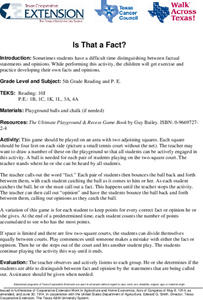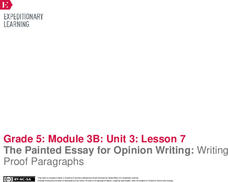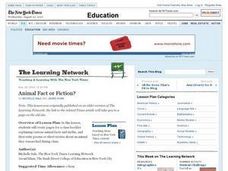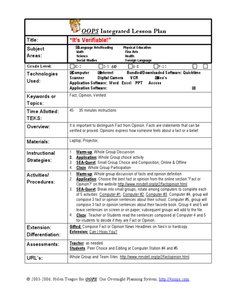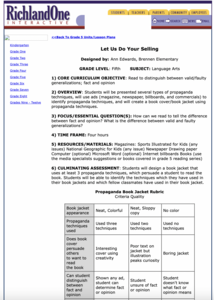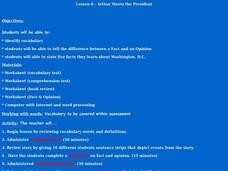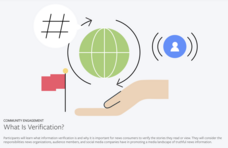Curated OER
School Newspaper
Fifth graders run a school newspaper on a school website and discover how to use various literary forms as they relate to the writing process. For this school newspaper lesson, 5th graders synthesize information from different sources,...
EngageNY
Identifying Author’s Opinion and Evidence: The Value of Sports in People’s Lives, Part I
Just like instant replay, it's time to take a closer look! Pupils work together to add ideas to a Close Readers Do These Things anchor chart. They then put their knowledge to the test as they read an informational article about the...
Curated OER
Identifying Facts and Opinions
Students understand the difference between a fact and an opinion. They identify facts and opinions in a news report. They identify facts and opinions in print and color code them with different colors.
Curated OER
Is That a Fact?
Fifth graders use physical activity to help them distinguish between facts and opinions. They are broken up into pairs and students give a fact or opinion (based on the call by the teacher) when the ball is bounced to them.
Curated OER
Expressing Your Views to the Letter
Analyze the motivation, purpose, and value of letters to the editor by examining letters written in response to the violence at Columbine High School. For homework, middle and high schoolers write their own letters to the editor about an...
Curated OER
Opinion
An important concept for youngsters to learn is that there is a difference between facts and opinions. Use Kirsten Hall's Animal Touch to introduce the idea that an opinion is how one feels or thinks about something and that others are...
Curated OER
Fighting Fake News
Fake news. Alternative facts. Internet trolls. In an age of Newspeak, it's increasingly important to equip 21st century learners with the skills needed to determine the legitimacy of claims put forth on social media, in print, and in...
Teaching Tolerance
Where We Stand
Everyone is entitled to their own opinion. Academics learn strategies to share their opinions and agree or disagree with others in a respectful manner. The resource provides scenarios to help individuals form opinions and share them with...
Curated OER
Lesson 4: Fact and Opinion - Rosa Parks: My Story
Sixth graders examine implicit and explicit opinions in a text about Rosa Parks. In this explicit and implicit opinions lesson, 6th graders participate in direct teaching, guided practice, and independent practice while reading an...
Curated OER
Groundhog Day
Don't miss this resource when Groundhog Day arrives! Youngsters read the book Groundhog Day by Gail Gibbons and practice reading comprehension skills, and then choose from a series of engaging, cross-curricular activities to help...
EngageNY
The Painted Essay for Opinion Writing: Writing Proof Paragraphs
It's time to proof read! Pupils read and analyze proof paragraphs from a model essay. They then practice writing their own proof paragraphs to express an opinion about offshore oil drilling.
Curated OER
Animal Fact or Fiction?
Read and discuss the article "Welcome to Cicadaville (Enter at Your Own Risk)" to gain a better understanding around the confusion regarding cicadas and locust swarms. In groups your young analysts research statements about animals to...
Roy Rosenzweig Center for History and New Media
Analyzing Political Campaign Commercials
Imagine a lesson that models for learners how to separate facts from opinions. How to detect bias. How to evaluate a source of information. How to identify propaganda. Although designed for middle schoolers, the activities in this packet...
Curated OER
Bias
Students apply techniques of distinguishing between fact and opinion. Students identify words associated with persuasion and argument. Students read and categorizer a variety of newspapers and articles. Students identfy bias in a...
Curated OER
Fact
Young scholars read about polar bears and discuss and identify the facts they learn about them. In this facts lesson plan, students explain why their facts are not opinions.
Curated OER
Identifying Facts
Students evaluate what a fact is and what the characteristics of a fact are. In this fact and opinion instructional activity, students read through chapters in their books and point out facts that they find that cannot be...
Curated OER
"It's Verifiable!"
Students examine the differences between fact and opinion. They define fact and opinion, evaluate their favorite fact or opinion on a website, and in small groups write sentences using facts and opinions about school and their favorite...
Curated OER
Let Us Do Your Selling
Sixth graders analyze several types of propaganda techniques and create a book cover using the techniques. In this propaganda techniques activity, 6th graders analyze the propaganda techniques used in various ads. Students analyze the...
Curated OER
Nutty About Peanut Butter
Pupils brainstorm list of lunchtime sandwiches, identify difference between fact and opinion, research facts about peanut butter online, complete Nutty About Peanut Butter worksheet, and create their own fact and opinion worksheets...
Curated OER
Arthur Meets the President
Students read, Arthur Meets the President, and review the story using sentence strips and complete a book review activity with a partner. In this reading skills lesson plan, students work on fact and opinion and...
Facebook
What Is Verification?
One of the most important skills news consumers and social media users must develop is the ability to determine the veracity of stories they read or view. Here's an interactive lesson plan that teaches high schoolers how to verify news...
Curated OER
Scapegoating and Othering
Scapegoating and "Othering" is the focus of a series of activities that ask groups to consider how these behaviors contribute to hatred and intolerance. Groups are given a scenario and discussion questions based on the situation. Whether...
Curated OER
Reading The Flag Maker
Young scholars explore The Flag Maker. In this reading comprehension lesson, students listen to the book The Flag Maker, making predictions and answering questions during the reading. Young scholars locate facts and opinions within the...
Curated OER
Reading And Responding: Lesson 15 Nonfiction
Eighth graders examine a nonfiction selection in a teacher led lesson plan. They examine the author's purpose for writing the selection and identify the difference between fact and opinion. The compare and contrast expository and...



